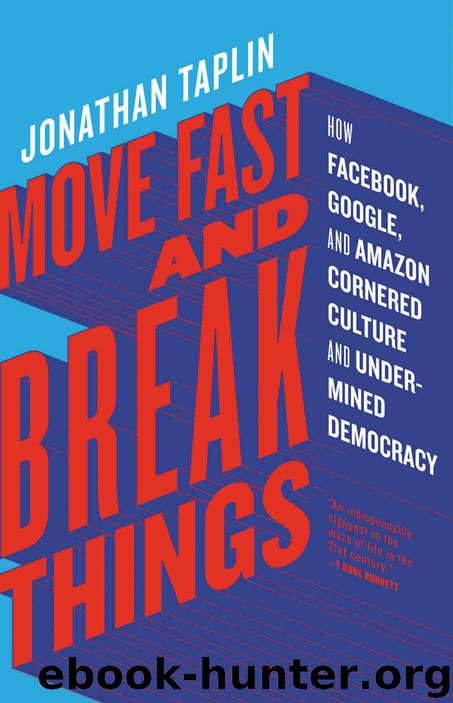Move Fast and Break Things: How Facebook, Google, and Amazon Cornered Culture and Undermined Democracy by Jonathan Taplin

Author:Jonathan Taplin
Language: eng
Format: mobi, azw3, epub
Tags: Computers / Electronic Commerce (See Also Headings Under Business & Economics / E-, Computers / Internet / General, Business & Economics / E-Commerce / General (See Also Computers / Electronic Commerce)
Publisher: Little, Brown and Company
Published: 2017-04-17T21:00:00+00:00
Bobbi Duncan, a twenty-two-year-old lesbian student at the University of Texas, Austin, tried to keep her sexual orientation secret from her family. But Facebook inadvertently outed her when the president of the Queer Chorus on campus added her to the choir’s Facebook group. Bobbi didn’t know that a friend could add her to a group without her approval and that Facebook would then send a note to her entire list of friends—including her father—announcing that she had joined.
Her father’s note on his Facebook page—“Hell awaits you pervert, good luck singing there”—makes it clear why Bobbi wanted to keep her sexual orientation to herself. Part of the reason she was unable to do so is because Zuckerberg and his Facebook team had embraced the notion of “radical transparency”—the idea that openness is the chief goal of the service and thus you can only use your real name. But many people, including Bobbi Duncan, disagree. Zuckerberg told Kirkpatrick, “To get to this point where there is more openness—that’s a big challenge, but I think we will do it. The concept that the world will be better if you share more is something that is pretty foreign to a lot of people and it runs into all these privacy concerns.”
The disdain for “these privacy concerns” first surfaced when in 2007 Facebook deployed an application called Beacon. This was essentially an alert system that told your friends you had purchased something on a partner site. It was built as an opt-out system, so you actively had to tell Facebook each time you didn’t want the site to broadcast your purchase to all your friends. It was a total disaster from the outset, but Zuckerberg was so confident that he knew better than his users that he refused to turn it off for many weeks while the PR disaster escalated. Eventually he relented and posted a mea culpa on his blog, saying, “We’ve made a lot of mistakes building this feature, but we’ve made even more with how we’ve handled them.” Despite Zuckerberg’s regret and a payment of $9.5 million in a class-action suit over Beacon, many who worked with him feel he doesn’t really understand privacy. Charlie Cheever, one of his key programmers, told Kirkpatrick, “I feel that Mark doesn’t believe in privacy that much, or at least believes in privacy as a stepping-stone [to radical transparency].”
The privacy issue was reignited in early 2014, when the Wall Street Journal reported that Facebook had conducted a massive social-science experiment on nearly seven hundred thousand of its users.
Download
Move Fast and Break Things: How Facebook, Google, and Amazon Cornered Culture and Undermined Democracy by Jonathan Taplin.azw3
Move Fast and Break Things: How Facebook, Google, and Amazon Cornered Culture and Undermined Democracy by Jonathan Taplin.epub
This site does not store any files on its server. We only index and link to content provided by other sites. Please contact the content providers to delete copyright contents if any and email us, we'll remove relevant links or contents immediately.
Bad Blood by John Carreyrou(6610)
Rich Dad Poor Dad by Robert T. Kiyosaki(6605)
Principles: Life and Work by Ray Dalio(6417)
Playing to Win_ How Strategy Really Works by A.G. Lafley & Roger L. Martin(6230)
Management Strategies for the Cloud Revolution: How Cloud Computing Is Transforming Business and Why You Can't Afford to Be Left Behind by Charles Babcock(4563)
The Confidence Code by Katty Kay(4251)
Thinking in Bets by Annie Duke(4218)
American Kingpin by Nick Bilton(3875)
Delivering Happiness by Tony Hsieh(3418)
Project Animal Farm: An Accidental Journey into the Secret World of Farming and the Truth About Our Food by Sonia Faruqi(3212)
The Power of Habit by Charles Duhigg(3128)
The Tyranny of Metrics by Jerry Z. Muller(3062)
Brotopia by Emily Chang(3047)
The Marketing Plan Handbook: Develop Big-Picture Marketing Plans for Pennies on the Dollar by Robert W. Bly(3045)
Mastering Bitcoin: Programming the Open Blockchain by Andreas M. Antonopoulos(3035)
I Live in the Future & Here's How It Works by Nick Bilton(2990)
The Content Trap by Bharat Anand(2917)
Building a StoryBrand by Donald Miller(2896)
Applied Empathy by Michael Ventura(2890)
